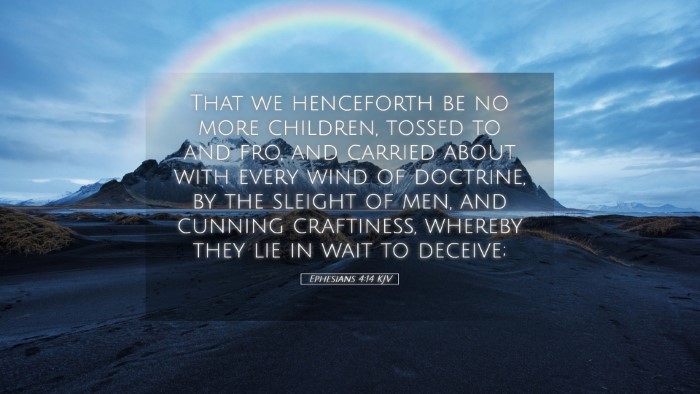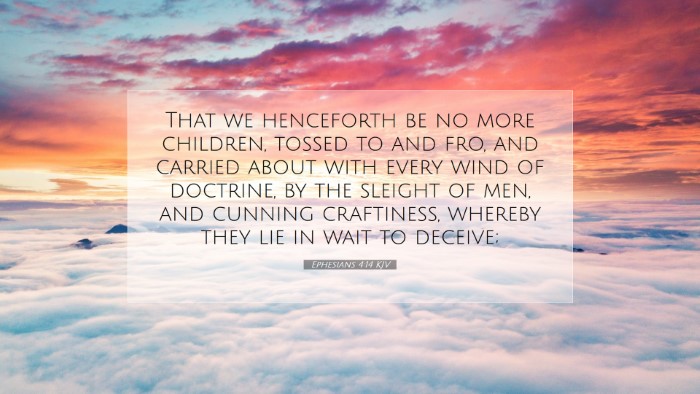Ephesians 4:14 Commentary
Ephesians 4:14 states, "That we henceforth be no more children, tossed to and fro, and carried about with every wind of doctrine, by the sleight of men, and cunning craftiness, whereby they lie in wait to deceive." This verse addresses the call for maturity in faith and steadfastness in doctrine, which is crucial for the spiritual growth of believers. The richness of this passage can be unpacked through the lenses of several public domain commentaries, allowing for a more profound understanding tailored for pastors, students, theologians, and Bible scholars.
Contextual Overview
The Apostle Paul, in his letter to the Ephesians, moves from theology to practical application in Chapter 4. This chapter revolves around the theme of unity and maturity within the body of Christ. Ephesians 4:14 acts as a pivotal moment where Paul emphasizes the importance of doctrinal stability and spiritual maturity.
Interpretations from Notable Commentators
Matthew Henry's Insights
Matthew Henry notes that "children" represents a state of immaturity and vulnerability. He cautions believers against being spiritually childish, as this opens them to manipulation by false doctrines. Henry emphasizes the need for a firm grounding in the truths of Scripture, which protects against the 'sleight of men'—deceptive tactics employed by false teachers. He highlights the correlation between spiritual growth and doctrinal stability, stating that a mature believer will not be easily swayed by erroneous teachings.
Albert Barnes' Analysis
Albert Barnes elaborates on the metaphor of being "tossed to and fro," describing it as a vivid picture of the instability of those who lack a solid understanding of Christian doctrine. He underscores the necessity of educated and discerning believers who can navigate the complexities of faith without falling prey to every novel idea. Barnes connects this instability to the influences of culture and the cunning nature of false teachers, suggesting that vigilance in doctrine is crucial to guard against deception.
Adam Clarke's Commentary
Adam Clarke provides a theological reflection on the phrase "every wind of doctrine." He interprets this as the various teachings and philosophies that arise, particularly in times of spiritual decline. Clarke stresses the historical context, warning believers of the perils of not standing firm in the foundational truths of the faith. His analysis urges believers to be steadfast, anchored in the teachings of Christ, and not swayed by contemporary trends or the persuasive arguments of the world.
Theological Implications
The implications of Ephesians 4:14 extend beyond individual growth; they impact the entire body of Christ. The maturity of individual believers contributes to the corporate strength and integrity of the Church. The command to not be "tossed to and fro" signifies that believers must engage actively in the process of discipleship, seeking to understand and defend their faith.
Spiritual Maturity
- Understanding True Doctrine: A thorough grasp of scripture is essential. Paul encourages believers to pursue knowledge and understanding to discern truth from error.
- Attaining Unity in Faith: Maturity leads to unity. As believers grow in their knowledge of Christ, they develop a collective strength, fostering a more profound sense of community within the Church.
- Building Resilience Against Deceit: Knowledge serves as an armor against deceitful teachings that aim to distort the responsibility and purpose of the Church.
Practical Applications for Believers
For pastors, students, and theologians, applying the truths in Ephesians 4:14 means advocating for a church culture that values sound doctrine, fosters spiritual growth, and consistently scrutinizes teachings against the biblical standard.
For Pastors
- Encourage congregations to engage in deep, thoughtful study of the Word.
- Prepare sermons that challenge believers to mature and not settle for complacency.
- Foster an environment where questions can be deeply examined, leading to growth and understanding.
For Students and Theologians
- Promote the critical study of historical and contemporary theological works.
- Engage in debate and discussion about doctrinal differences with civility and love, always returning to Scripture as the ultimate authority.
- Seek mentorship from more mature believers to help cultivate a robust faith.
Conclusion
Ephesians 4:14 serves as a staunch reminder of the importance of spiritual maturity and doctrinal stability. The insights from Matthew Henry, Albert Barnes, and Adam Clarke reinforce the necessity for believers to engage critically with their faith, ensuring they are not easily swayed by the various teachings that arise. As the body of Christ seeks unity and understanding, the collective growth in maturity will empower believers to stand firm against the winds of false doctrine, contributing to a robust and resilient Church.


